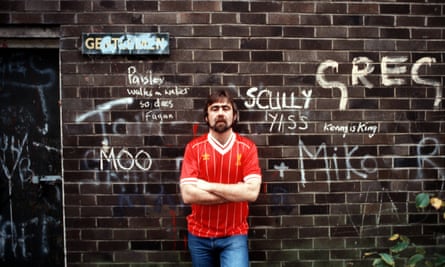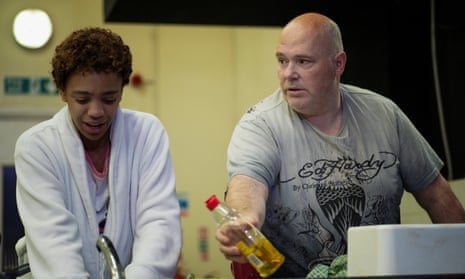Ten years in, and the metropolitan elite is at last receiving regular tuition in austerity, at the theatre. Often the plays make their way to the capital from other urban centres. Love, currently at the National Theatre, was created using a devising process by Alexander Zeldin, associate director at the Birmingham Repertory Theatre. It starts playing there at the end of January.
Set in a hostel for homeless people, it features a disparate group of the desperate: a father of two whose new wife is 33 weeks pregnant, all four of them sharing one room; an adult son and his ailing, incontinent mother, sharing the room next door; plus a female refugee from Sudan and a male refugee from Syria who drift in and out of the claustrophobic lives of the central group. The action takes place in the inadequate communal area, where there’s a single, shared loo and basic kitchen area but no bath or shower.
The play’s strength is that it has no truck with sentimental ideas of the blitz spirit, with comrades in adversity helping each other out. The residents are all mistrustful of each other, resentful of the idea that the chronic needs of one might trump the chronic needs of another in the quest to bag that elusive council house. They are pitched against each other in a wretched competition, clinging to the purity of their helplessness. On the day I saw it, Love got a standing ovation.
Meanwhile, at London’s Royal Court, Wish List has just opened – written by Katherine Soper and produced in a collaboration with the Royal Exchange in Manchester. Tamsin is trying to flourish in her zero-hours job packing for an internet delivery company. Her strict supervisor constantly criticises her failure to hit highly ambitious production targets, which (he always points out) others seem able to achieve. Tamsin cares for her younger brother, who stays home being tortured by his obsessive-compulsive disorder and the fact that despite his terror of leaving the flat or meeting strangers he has just been declared fit for work.
Both plays explore competition among the marginalised as a force that further alienates people from each other. Any sense of community, of shared adversity, is fleeting and hard won, a luxury that is a threat to individual survival and not, therefore, to be indulged for long.

In Boy, at the Almeida theatre last year, the Sheffield-born writer Leo Butler explored the awful, dehumanising effects of such alienation, through the fragmented meanderings of a school leaver around the kind of council estate that the people in Love dream of. This is a kid who has kept himself to himself so much that he is barely registered by others, troubling because of his troubles, and pretty much a ghostly presence in his own life. It was very much a psychological mood piece: disordered, disturbed and bleak. In all the plays, poor mental health is just another bitter fact of life.
I’m glad of these plays, which express the emotional and material lives of so many people in Britain so well. I believe in the power of creative expression. Yet I’m keenly aware that plays reach only their audiences and that a lot of people are hostile to theatre, even when they can afford it. I remember Play for Today on the TV. It produced one of the British films I rate most highly – Just a Boy’s Game, written by Peter McDougall – and fostered such talents as Mike Leigh, Alan Bleasdale, Dennis Potter, Jack Rosenthal and Alan Clarke (though this was the 70s, so no women.)
But it also fostered insights among its viewers in a way that appears beyond most TV today. I love a good drama series. But I do wish television would find the confidence and boldness truly to reflect Britain back at itself once more. The talent is there, the stories, the ideas. But the mass media seem unable to tap into it. Everything’s a genre piece.
When a revival of the one-off drama was suggested in the mid-2000s, a certain Michael Gove declared that Play for Today had been “exercises in viewer patronisation”. One feels that if the BBC tried to do something like this again, it would be accused of disseminating propaganda. Ken Loach’s film I, Daniel Blake – to my mind not nearly as strong as any of the plays I’ve mentioned – was criticised on much the same terms.
It feels a bit sinister, narratives being deemed too political or didactic for the people they represent to have access to them. It seems even more sinister that the party in power is the one least likely to want such stories told.
The BBC now survives, politically, by carefully avoiding too much in the way of public service. And it’s weird beyond expression, surely, that one of the contemporary privileges of the liberal elite is the ability to sit in comfortable theatres in London, bearing witness to the misery of the dispossessed.

